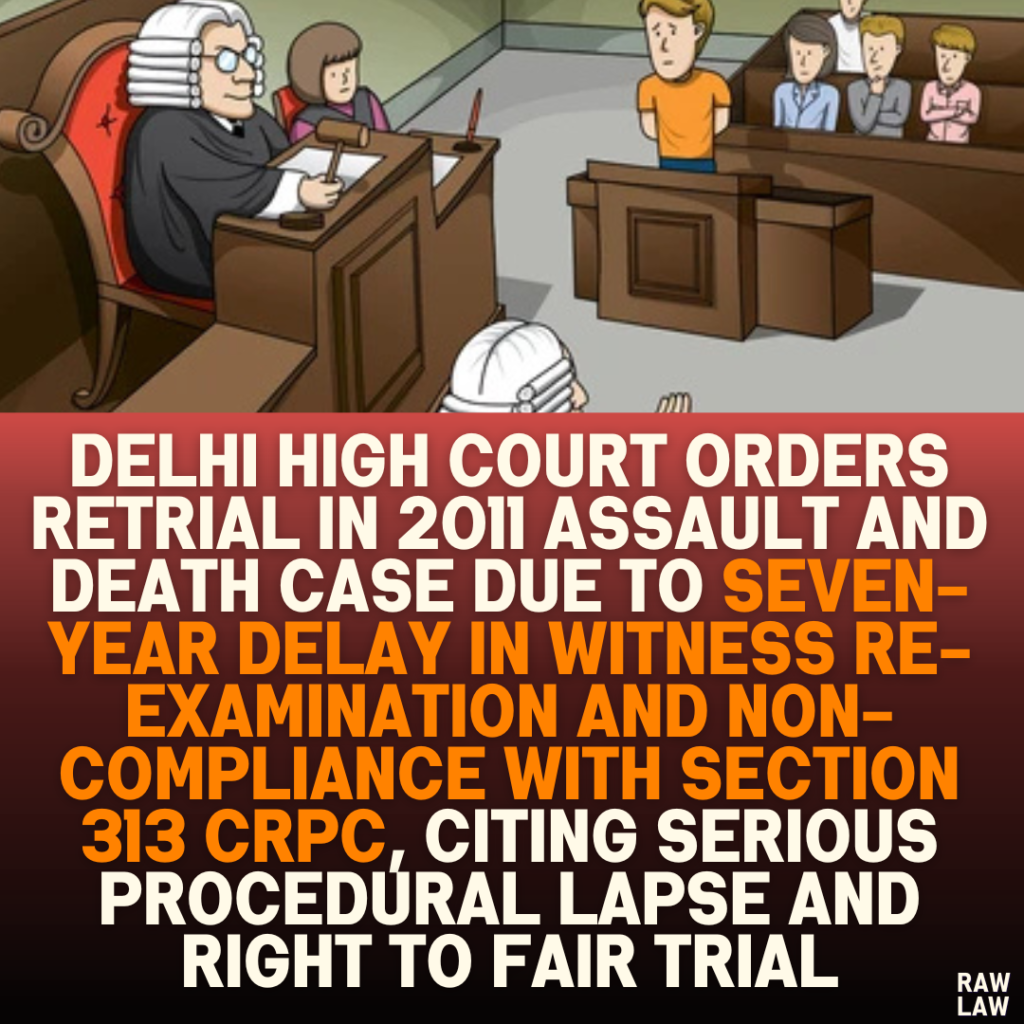Court’s Decision:
The Delhi High Court set aside the conviction and ordered a retrial, specifically instructing the trial court to re-examine the appellants under Section 313 of the CrPC. The appellate court emphasized that non-compliance with Section 313 had deprived the appellants of a fair chance to counter new evidence introduced during a delayed re-examination of key witnesses. The trial court was directed to proceed afresh from the stage of recording the statements, with a mandate to expedite the process within six months.
Facts:
The case involved an incident on August 3, 2011, in which the appellants and other accused allegedly assaulted the complainant’s party with sticks. The attack led to the death of Anil Kumar. FIR No. 302/11 was registered at PS Seemapuri, and the appellants were subsequently convicted under Sections 304(II), 308, and 323 of the IPC.
Issues:
The main issue was whether the appellants’ trial was vitiated by the trial court’s failure to comply with Section 313 of the CrPC, depriving them of an opportunity to respond to new evidence introduced during the re-examination of witnesses.
Petitioner’s Arguments:
The appellants argued that the re-examination of prosecution witnesses PW-1 and PW-2 in 2019, without a corresponding re-examination of the accused under Section 313, was procedurally unfair. Citing Nar Singh v. State of Haryana, they contended that non-compliance with Section 313 undermined their right to a fair trial and materially affected their defense.
Respondent’s Arguments:
The prosecution argued that the non-compliance with Section 313 had not been previously challenged in the trial court, suggesting that the objection should not impact the appellate court’s decision.
Analysis of the Law:
Section 313 of the CrPC mandates that all evidence against the accused be presented to them for explanation. The court emphasized that this examination is a fundamental aspect of fair trial standards within Indian criminal jurisprudence, ensuring that the accused has a chance to clarify any incriminating circumstances against them.
Precedent Analysis:
The court referred to Basavaraj R. Patil v. State of Karnataka, underscoring that a fair opportunity under Section 313 is not merely procedural but essential for justice. Additionally, Kuldip Singh v. State of Delhi established that evidence not put to the accused under Section 313 CrPC cannot be used against them.
Court’s Reasoning:
The High Court found that the delayed re-examination of PW-1 and PW-2 introduced new details that the appellants were unable to address, constituting a serious procedural lapse that prejudiced the appellants’ defense. The selective re-examination raised concerns about the integrity of witness testimonies, given the seven-year delay between initial testimony and re-examination.
Conclusion:
The High Court remanded the case to the trial court for a fresh hearing from the stage of recording statements under Section 313 CrPC. It underscored that compliance with Section 313 is mandatory, with the non-compliance in this case causing significant prejudice to the accused.
Implications:
This judgment reaffirms the importance of Section 313 CrPC as a safeguard for the accused’s right to a fair trial. It cautions trial courts against procedural lapses in the re-examination process that could compromise the fairness of the trial. The directive for a retrial also stresses the judiciary’s commitment to upholding fair trial standards.




Pingback: High Court of Jammu & Kashmir and Ladakh Rules Local Preference Inapplicable Where Candidate's Merit is Inferior, Dismisses Petition Challenging Non-Selection in Laboratory Assistant Position - Raw Law